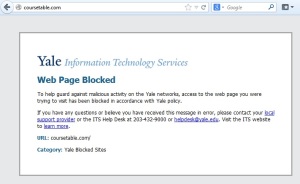
Yale Bluebook (right) allows students to visualize their weekly course schedule as they shop for available offerings.
(Author Illustration)
All seems infected that the infected spy,
As all looks yellow to the jaundiced eye.
(Alexander Pope, An Essay on Criticism, 1709)
Ask Benjamin Ginsberg what he thinks about universities as a free-flowing marketplace of ideas. Ask him what he thinks about the academy as a primary force in the careful cultivation of young minds. Now, ask him about an administration’s role as responsible bureaucrat. No, seriously, ask him.
Ginsberg, you see, is not a fan of institutional red tape. And now neither are 1,840 Yale University students (roughly 34% of the entire undergraduate student body) forced to use a crumbling online course catalog system despite a markedly better (and available) alternative.

Access denied: Peter Xu and Harry Yu’s system was taken offline without notification from the university during the first week of course registration.
Enter Yale Bluebook and it’s creators, twin brothers Peter Xu and Harry Yu, both senior Computer Science majors at the university. Frustrated with the boring, burdensome method of registering for courses, Xu and Yu sought to improve the years-old system best categorized as a clunky counterpart to the revered—and equally staid—print copy. By adding enhanced functionality and a much-need virtual renovation, the sleek, clean interface afforded students campus-wide a shopping experience akin to the one made popular by online retailer giant Amazon. Of course, that was until it was brought to the attention of the Yale administration—two semesters later.
Long unnoticed by the administration, the brothers’ Bluebook crafted quite a following. However, more important than understanding the existence of an obvious need among students, was the university’s own self-interest and personal pride.
“They felt that they knew best about how students should use data,
about how students should choose their courses, and basically
wanted to enforce that on students. And we thought that students
should actually have control of their own education.”
–Peter Xu (Yale Bluebook co-founder)
Why not leverage some of the brightest student minds in the country? In this digital age, where consumers of information are now producers of the same, it has become strikingly clear the responsibility students want in shaping their education. They want ownership of a specialized, not generalized, career track where the curriculum is individually tailored to suit their goals and not mass produced. This initiative was a demonstration of two students motivated by entrepreneurial application instead of academic theory, and by proven return instead of professoriate say-so. The end result was the creation of a system that students not only prefered to use but on which they ultimately relied despite any institutional assistance.
Great post! I think Yale should have allowed the site to run as it made life simpler for students. Because this was not an institution run program it was shut down? This lends itself nicely to Jenkins’ teachings on participatory culture. Online communities are supposed to promote student input and here we see how traditional educational settings are denying students the ability to participate in their own way. Clearly, the institution is demonstrating that its own content and creations are what are valued and accepted versus anything students contribute. This site was genius and rather than promote youth material, Yale sent the message that the college is not for a participatory culture. What do you think were Yale’s specific reasons for closing the page?
As one who works in higher education, and specifically responsible for the communications of a student registration and course evaluation system, I can attest that there is tremendous pressure among universities to safeguard proprietary content. This is no different with course descriptions and information about a star-studded professoriate—sources of competitive advantage for some institutions. But these fears, I feel, could have been allayed if Yale administration worked with the creators of Bluebook to establish privacy guidelines and copyright concerns. It was an opportunity for the administration to leverage the talents of a group of students who, quite simply, developed a better product.
Very interesting. Unfortunately, academia is a place where reinforcing the hierarchy and clinging onto a “this is just how we’ve always done it” mindset can come at the detriment of innovation and creative problem-solving. I would have hoped that Yale, one of the finest and most prestigious institutions in the world, would have had a more open and receptive attitude toward this program and viewed it as a demonstration of their students’ ingenuity rather than be threatened by it.
I sometimes think universities are wont to perpetuate an image of academia as an archaic erudite ecosystem. However, in an age of digital and participatory culture, education leaders must dismantle the notion that this tradition of learning is but for the privileged few.
You post interesting content here. Your website deserves much more visitors.
It can go viral if you give it initial boost,
i know very useful service that can help you, just search in google: svetsern traffic
tips